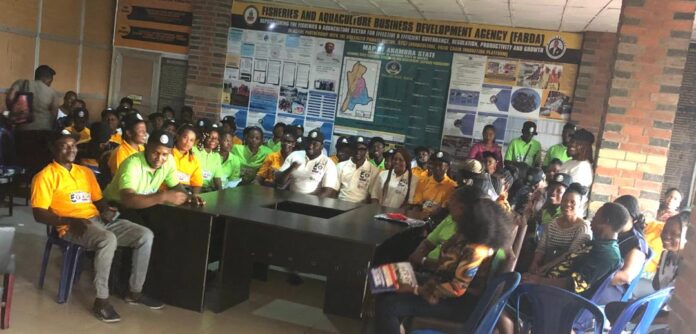The second batch of the ECOWAS-sponsored youths training on the improved Fish Production Business System and Technology called Taenprowiz has commenced in Anambra State.
Under this ECOWAS Youth Employability Project (ECOWAS YEP), the second batch of Taenprowiz Youth trainees, comprising 200 youths, have been onboarded.
Eligible trainees include youths between 18 and 35 years of age, Nigerian Citizens and citizens of other ECOWAS countries.
The News Chronicle correspondent in Anambra reports that the training commenced with a formal onboarding process involving digital and manual documentation for the successfully selected trainees, after three months of rigorous processing of nominations, applications, candidates’ response collation and final shortlisting.
The Taenprowiz is a total Solution package (a System and Technology) already patented, and it is about the business Goal, investment knowledge, operations work plan, financial literacy, and practical cashflow in the Fish production business.
During a series of virtual and physical meetings, trainees were taken through the rudiments of the business evolution process, the ideation, the Business Concept formulation involving product or service, customer, value proposition and the distribution channel as well as the basic principles of the Taenprowiz Fish Production Business System and Technology (Computer Operating System).
The trainees during the first physical meeting held at the FABDA Office Complex, Awka, learned the first principles, processes, and protocols of actualising a functional Table Fish Production Business from the idea stage up to generating the Business Plan.
The Managing Director and CEO of the Fisheries and Aquaculture Business Development Agency, FABDA, who is also the Training Co-ordinator, Mr. Emeka Iloghalu said the training is critical in helping the youths understand the concept of Throughput, Inventory and Operating Expense in the Table Fish, Brood Stock and Seed Fish Production Business.
“The trainees will also be able to deploy the concept of Throughput in planning for the production operations for the Table Fish Production Business, as well as constrain the production operations work plan with the Cashflow requirements based on the Throughput concept to generate the Operations Business Model/Plan
“It is also expected to help them produce a finance and investment forecast to model the Table Fish Production Business growth path from the very beginning,” he said.
Iloghalu noted that the youths, when empowered through the training with skills and protocols of seed fish stocking, fish feeding, fish grading, fish water management and fish harvesting, will be well equipped for immediate employment and engagement in the fish business.
“Successful Youths will be ready for employment in any standard Table Fish Production Business/Farm, be co-operators in any Co-operative Fish business and can become fish business investors,” Iloghalu enthused.
The FABDA boss noted that the ECOWAS Commission is looking forward to using the initiative to increase the population of youths within the ECOWAS region who are engaged in the Fish business and Agribusinesses.
This, he noted, is because the blue economy and agricultural sector are strategic sectors that have enormous capacity to create wealth and employment, as well as contribute to resolving the food security question in the region.
Iloghalu noted that the FABDA has been on its mandate to drive and industrialize the Fisheries and Aquaculture economy in Anambra, and this falls in line with some strategic targets including to achieve 51 million kg of table fish production per annum for self-sufficiency.



